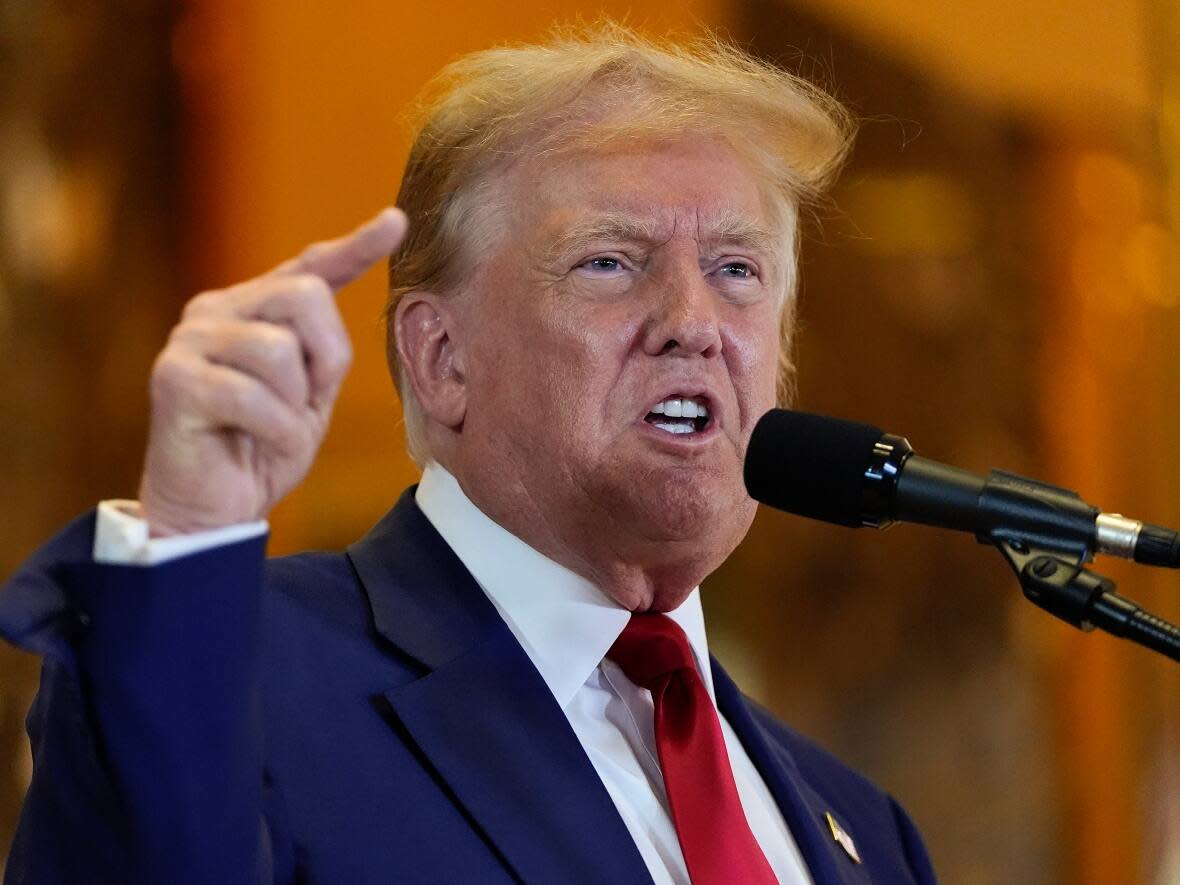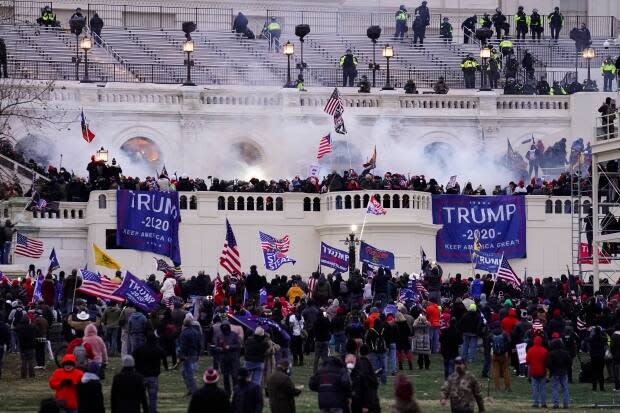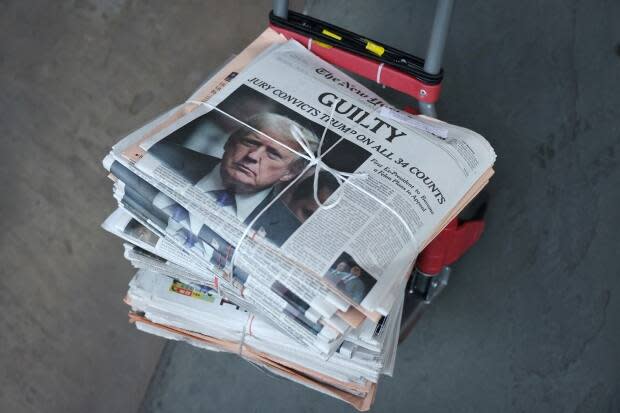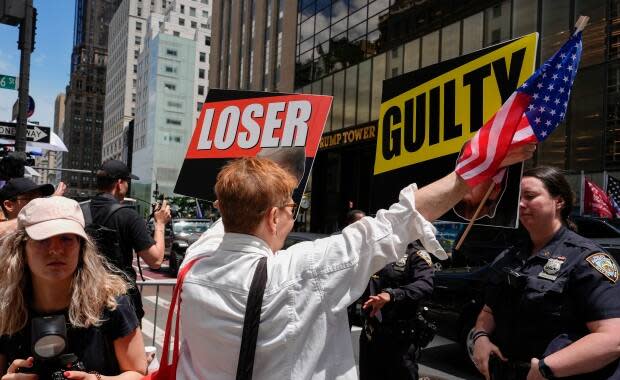Americans split over Trump verdict? So are New York's criminal law professors

Here's what happens when you try surveying criminal-law professors about an unprecedented case in their state of New York: the guilty verdict of Donald Trump.
CBC News asked them two things: their view of the case and of Trump's chances of winning an appeal.
We contacted two dozen professors specializing in criminal law and in particular white-collar crime, given that this case was about falsifying business records.
The vast majority declined to comment, for different reasons. One divulged that he trusted few colleagues to offer an unbiased opinion, untainted by their own politics.
WATCH | Strong reactions to verdict:
But five answered. Two expressed doubts about the case, two did not, and one shared detailed analysis without stating an emphatic opinion.
The scattershot responses demonstrate that the mixed reaction to this trial goes well beyond the partisan sparring on cable TV news.
A former colleague of Manhattan District Attorney Alvin Bragg says it must have been difficult to decide whether to proceed with charges.
"I'm sure he had a lot of sleepless nights," said David Dorfman of Pace University, a former criminal defence lawyer and Bragg colleague at New York Law School.
"Because what if Trump has gotten acquitted — or a hung jury? There'd be a lot of second-guessing."
Would he have done it? Without stating his own view, Dorfman described it as a difficult call.
He says he's not certain Bragg would have proceeded, had he not inherited the ongoing investigation when he entered his role in 2022, with his staff having already poured considerable effort into it.

At the same time he defends Bragg as a straight-shooter and defends the case against some criticisms.
Trump is accused of more serious crimes. However this case is likely the only trial he will face before the November vote, including for the attempted overturn the 2020 election.
What's unique about the Trump case
Some basic facts of the case are clear-cut: A porn star said she'd had unprotected sex with Trump two decades ago, while his wife was pregnant. Then, during the 2016 presidential campaign, a Trump ally paid her $130,000 to keep quiet and, after the election, Trump repaid that ally, Michael Cohen, but declared it was for legal fees — a business expense.
Whether this constitutes a felony, however, is what's being disputed.
There's a fundamental fact about the crime charged here: Falsifying business records is only a felony if it's done to hide another, underlying, crime.
As an example, let's use a pizzeria business. The pizzeria owner can falsify records, scribbling down a made-up total for how much tomato paste he bought. If it was done out of carelessness, that's not a felony. If it was done to cheat on taxes, it is.
The accusation was that Trump intended to hide up to three underlying crimes: violating the spending limit for a federal election, in the process breaking both a state crime against fraudulent campaigning and a state tax law.
WATCH | CBC News was in the courtroom:
Jurors were instructed that it didn't matter which crime Trump intended to conceal, nor whether they all agreed on the underlying crime, nor whether he ever committed that underlying crime, nor whether he was charged.
All that mattered was whether they reached a unanimous verdict that he falsified records, and that he did so intending to break any of those three laws.
So was this process rare, and was it proper?
CBC News asked law-school professors at Cornell, Columbia, New York and Pace universities, as well as a pair of colleagues in other states recommended by those professors.
"The use of three crimes in this case was both rare and risky," said John Coffee, a professor at Columbia University in New York City who specializes in business crime.
"It raises the prospect of a unanimous jury where four [jurors] think [Trump committed] Crime A, four think it is Crime B and four think it is Crime C, but not even a majority supports any specific crime."
Asked whether Trump has a good chance at winning his appeal, Coffee says yes — for several reasons.

He cites the Enron case, when a lack of clarity about how jurors interpreted the case led the U.S. Supreme Court to narrow the charges.
He also raises the potential argument that, constitutionally, Trump is protected against being required to reveal the affair.
He also raised federal-state issues, like whether rolling the federal elections violation into the state charge will stand.
"On this basis, Trump has a shot at a successful appeal," said Coffee, saying there's a chance no law was broken here, and that it's not obviously illegal to pay hush money.
Anthony Dillof at Wayne State University in Michigan predicts Trump would likely win at the U.S. Supreme Court if it agrees to hear his petition for review.
That appeal would be launched on constitutional grounds, usually after the appeals process in state courts, which could take a couple of years.
WATCH | How likely is jail?
State prosecutors have said charges over falsifying business records are extremely common — the Manhattan DA's bread and butter.
It's true that this crime is commonly charged, Dillof said. What's not common is using it to enforce a federal election law.
And he suggests politics drove the case.
"[That] is a certainly novel application of the law — one that I would describe as a 'stretch,'" he wrote in an email.
"I do not believe such a stretch would have been made if the target were not a polarizing political figure like Donald Trump. Thus, I view prosecution as problematic."
Dillof adds that he has colleagues he respects who disagree with his assessment.
And disagree they do.
Just because this case is novel, Dorfman says, doesn't mean it's inherently problematic. Unprecedented cases happen, he says.
"That doesn't mean it's illegal or unconstitutional," he said. "Things happen that never happened before.'"
That said, Trump could try several avenues for appeals.
They include the federal-state issue, accusations of bias and the jurors being told they need not agree on an underlying crime, he says.
But Dorfman has no patience for the bias argument, dismissing as "absurd," for example, the suggestion that Justice Juan Merchan disqualified himself by donating a few dollars to Joe Biden's campaign and because his own daughter works for some Democrats.

"The judge played it very fairly, down the middle," Dorfman said.
He also doubts Trump's argument that jurors needed to agree on one underlying crime, but is less emphatic here: "I think that's a closer call."
He predicts Trump's appeals will fail in New York state, then possibly succeed at the Supreme Court later, in well over a year, unless it takes the rare step of agreeing to hear the case immediately as an emergency.
At Cornell University, John Blume says it's a common instruction to jurors that they need not agree on the exact underlying crime, as long as they're unanimous that there was one.
"There is nothing unusual about the judge's charge," he said. "It is totally consistent with New York law."
He says he doesn't see an appellate reversal as likely, but without having read the full case record can't say with certainty.
Rachel Tillie Goldberg, who practised appeals and founded the Appellate Criminal Defense Clinic at Cornell, says she never predicts the outcome of appeals.
But she praises Merchan as an experienced judge, expressing confidence he was scrupulously careful.
"His rulings seemed eminently reasonable," she said.
"That said, no trial is without error. Often the question ... is whether the error was so significant that it affected the verdict, which is a high bar to meet."
She says there's nothing unusual about prosecutors aggressively pursuing a case — even piling on charges to encourage a guilty plea.
That's one reason few falsification of records cases ever make it to trial, she says.


